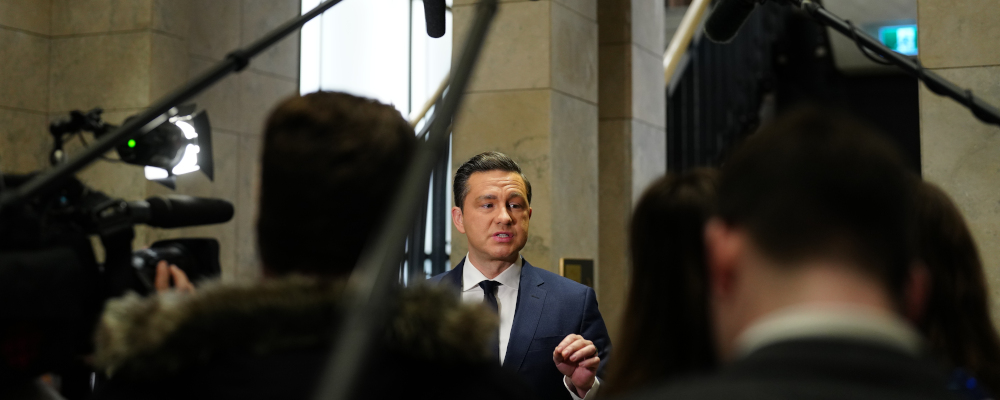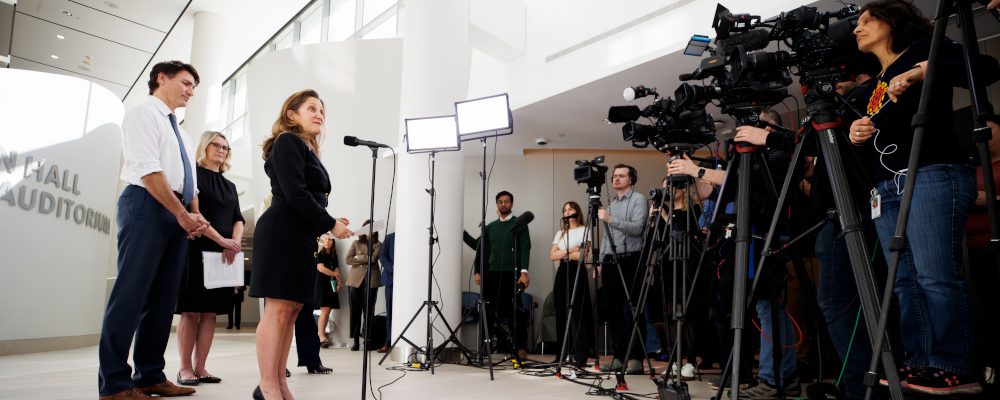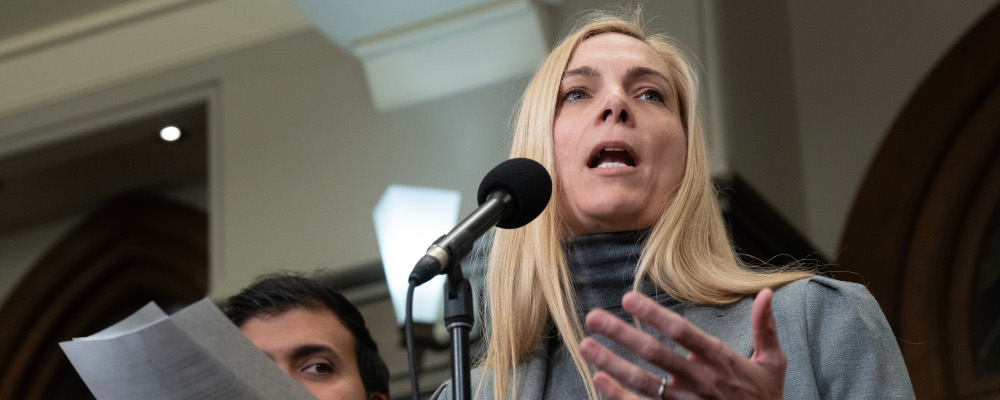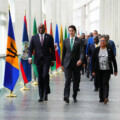As an avid consumer of wonky right-of-centre new media content, I’m always eager to receive my daily email from The Line. I read it after The Hub newsletter (I know where my bread is buttered!), but I enjoy it nonetheless. So when I saw last week that the chronically reasonable Matt Gurney had published under his own byline, I eagerly opened the email, and when I saw the headline—“What I got wrong about Poilievre”—I was practically salivating. As I began reading, my mind leapt back to a little more than two years ago to February 1, 2022. The trucker convoy had swept into Ottawa, Erin O’Toole’s leadership of the Conservative Party of Canada was hanging on by a thread, and some Canadian political blowhards were drinking wine at 10 pm on a YouTube livestream (yes, of course I was there), talking about what would happen next.
There were several guests who joined and left throughout the night and while there were various points of agreement and disagreement, one thing was clear. When it came to empathizing with the trucker convoy and finding a new party leader, I was on my own. It wasn’t that the hosts and other guests thought O’Toole was doing so great, it was just that they were deeply and incredibly concerned about what very dangerous dancing with the devil of virulent populism would do to decimate one of Canada’s otherwise mainstream political parties. There was quite a bit of fretting. It’s the same concern that Gurney had written about five months prior in the column he re-assessed last week. And it’s the same concern most mainstream Canadian commentators have expressed (mind you with decreasing vigour and enthusiasm recently) ever since.

So, when I read Gurney’s headline I thought, finally! Finally, they’ve come around. They get that the carbon tax debate wasn’t in fact settled, our monetary policy wasn’t above reproach, Canadians weren’t OK with creeping woke culture, and the country isn’t made up entirely of Liberal voters willing to lend Tories their vote if only we would stop being so scary. No such luck. In fact, as I read Gurney’s piece, I couldn’t help but think that despite his authentic effort to do otherwise, he was largely avoiding the crux of the matter. Two years ago, he and so many others thought our political frame was fixed. That certain issues were settled, that certain voters were locked in, and that fights for power would involve quibbling around the edges. They weren’t thinking big enough.
In the end, Gurney does almost get there, but before he does, a friend and source walks him through some other, mostly irrelevant factors. They’re worth exploring lest others be tempted to use them to explain their own miscalculations. First, they get into the two-year-old supply and confidence agreement between the Liberals and the NDP. The deal was a bit of a surprise, sure, but it didn’t change anything. Not one iota. In fact, Canadian politics would be in an almost identical place today had it not been struck. The NDP would still be broke, torn between trendy urban social issues and old-fashioned socialist economic policy, unable to differentiate a message track or put forward a value proposition, and propping up an unpopular government. The supply and confidence agreement isn’t “the single best thing that happened to Poilievre,” as Gurney’s source put it. It’s irrelevant.
Next, they turn to the People’s Party of Canada. Sidelining the PCC is relevant they think (agreed!) but not in the way one might expect (oh). It’s true that the PPC isn’t relevant anymore (do they think this happened by accident, I wonder?) but according to them, the reason this has helped the Conservatives isn’t because they can own more right-wing votes, it’s because Maxime Bernier’s lack of success quiets the silly western Conservative MPs who just think the PPC could be a problem for the Conservatives. It seems not to occur to either Gurney or his source that perhaps a broad coalition that has room and respect for voters (and Members of Parliament) with right-wing views isn’t an accident, but an actual strategy. And that the reason CPC MPs have stopped worrying about the PPC is because the strategy is working.
After a cursory acknowledgment that maybe Poilievre’s early pressure on inflation has paid off, Gurney and his source turn to the big whammy: the pandemic. In short, as they would have it, O’Toole was unlucky because he had to deal with the pandemic, and Poilievre’s been lucky because he hasn’t. But, of course, Poilievre did deal with the pandemic. He launched his leadership at peak insanity surrounding its fallout. Indeed, Poilievre’s willingness to step out on the trucker convoy and take a firm stance for personal freedoms and a return to normalcy ushered in a mainstream revolt against unreasonable restrictions. He didn’t luck into the end of COVID lunacy, he practically manifested it.
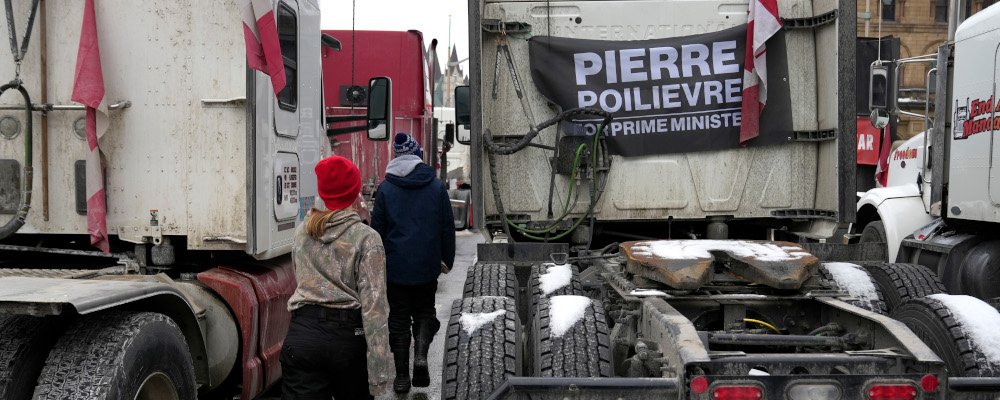
Finally, Gurney and his source contemplate changes in male and female voting habits. They think Gurney wasn’t hip to Trudeau’s waning popularity with men. True enough, but that’s just another way of saying Gurney wasn’t hip to changes in voting habits in general. The last year of polling has seen Liberal support wane and Conservative support increase across every demographic, including women of all ages. So, the question isn’t why didn’t people see a wave coming—it’s how did they miss the tsunami?
Ultimately Gurney’s source raises an observation that gets close to the truth. He tells our columnist that his analysis was too stuck in the present (or the near past). Gurney concedes that he was too biased against change and therefore wasn’t open to seeing it coming.
This admission is indeed closer to the truth, but they still don’t make it all the way there. Gurney’s source thinks that he should have foreseen that a different Conservative leader could motivate different voters on different things, thereby changing the political dynamics. This explanation would be adequate if Poilievre’s strategy was about suppressing his opponent’s votes and motivating his own, attempting to eke out a victory through sophisticated narrowcasting and targeting. But that thinking is still too limited.
Poilievre’s Conservatives aren’t just trying to motivate static voters, they’ve been persuading changing voters, building a coalition from the bottom up, re-litigating “settled” policy debates, like on carbon tax and crime, and staking out new policy ground, like on drugs and DEI.
Recent history is riddled with examples of conservatives thinking matters were settled and missing out on opportunity or mitigating challenges. When Conservatives thought balanced budgets should be a given and matters of fiscal discipline were settled, Trudeau went about persuading the electorate that they ought to give deficits a try, and it worked for him. When Republicans became convinced they couldn’t win with non-white Americans unless they had a more permissive approach to immigration, they sat on the sidelines until Trump broke the issue open again. Matters of great debate often seem very settled—until an ambitious leader comes along, makes a strong argument, and suddenly they’re not again.
Snark aside, I’m impressed with Gurney’s willingness to interrogate his priors. Our aging, brittle commentariat would do well to take a page out of his book. Watching our 2021 YouTube livestream now, it’s incredible how limited we all were in our thinking. In my efforts to convince the group that success would not come from sticking with O’Toole, I suggested (with some trepidation) that Conservatives should envision victory as a big majority of seats and more than 40 percent of the popular vote. Everyone kind of shook their heads. To be fair, at the time, I sounded naïve. It’s only now, in retrospect, that it doesn’t seem so crazy. But that’s the thing about hindsight.
Recommended for You

Ginny Roth: J.D. Vance, Pierre Poilievre, and how they slice their economic pie

David Polansky: As President Biden leaves the race, will the Democratic Party hodgepodge hold?

Peter Menzies: The mainstream media should love Doug Ford, now that he’s subsidizing them

Geoff Russ: A future Conservative government must fight the culture war, not stand idly by

